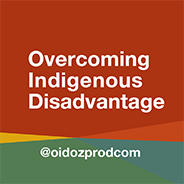Overcoming Indigenous Disadvantage
In April 2002, the Council of Australian Governments commissioned the Steering Committee for the Review of Government Service Provision (Steering Committee) to produce a regular report against key indicators of Aboriginal and Torres Strait Islander disadvantage.
The Steering Committee is advised by a working group made up of representatives from all Australian governments, the Coalition of Aboriginal and Torres Strait Islander Peak Organisations, the Australian Bureau of Statistics and the Australian Institute of Health and Welfare.
The Overcoming Indigenous Disadvantage report measures the wellbeing of Australia's Aboriginal and Torres Strait Islander peoples. The report provides information about outcomes across a range of strategic areas such as early child development, education and training, healthy lives, economic participation, home environment, and safe and supportive communities. The report examines whether policies and programs are achieving positive outcomes for Aboriginal and Torres Strait Islander people.
The latest edition of the Overcoming Indigenous Disadvantage report was released on Thursday 3 December 2020.
Please note: Aboriginal and Torres Strait Islander people are advised that this website may contain names, images and voices of deceased people. It may also link to other websites which contain names, images and voices of deceased people.
You may also be interested in
Steering Committee for the Review of Government Service Provision

Overcoming Indigenous Disadvantage: Key Indicators 2020
This report measures the wellbeing of Aboriginal and Torres Strait Islander people. It provides comprehensive data across a range of outcome areas, along with supporting material on the strengths of Aboriginal and Torres Strait Islander people, and the structural and systemic barriers that need to be addressed if outcomes are to further improve.
Overcoming Indigenous Disadvantage: Key Indicators 2016
This comprehensive report card measures where things have improved (or not) against 52 indicators across a range of areas including governance, leadership and culture, early childhood, education, health, home and safe and supportive communities, and includes case studies on things that work to improve outcomes.
Overcoming Indigenous Disadvantage: Key Indicators 2014
This report measures the wellbeing of Australia's Indigenous peoples. The report provides information about outcomes across a range of strategic areas such as early child development, education and training, healthy lives, economic participation, home environment, and safe and supportive communities.
Overcoming Indigenous Disadvantage: Key Indicators 2011
This fifth edition, nine years after this series was commissioned, shows there is still a considerable way to go if we are to fulfil COAG's commitment to close the gap in Indigenous disadvantage.
Overcoming Indigenous Disadvantage: Key Indicators 2009
The fourth report in the series indicates while the gaps are narrowing in some areas, in too many cases outcomes are not improving, or are even deteriorating. We still have a long way to go to fulfil COAG's commitment to close the gap in Indigenous disadvantage.
Overcoming Indigenous Disadvantage: Key Indicators 2007
This third Report in the series reveals that many Indigenous people have shared in Australia's recent economic prosperity, recording improved employment outcomes and higher incomes. There have also been welcome improvements in some educational and health outcomes for Indigenous children.
Overcoming Indigenous Disadvantage: Key Indicators 2005
A Steering Committee report on the key indicators of indigenous disadvantage, undertaken at the request of the Council of Australian Governments.
Overcoming Indigenous Disadvantage: Key Indicators 2003
A Steering Committee report on the key indicators of indigenous disadvantage, undertaken at the request of the Council of Australian Governments.